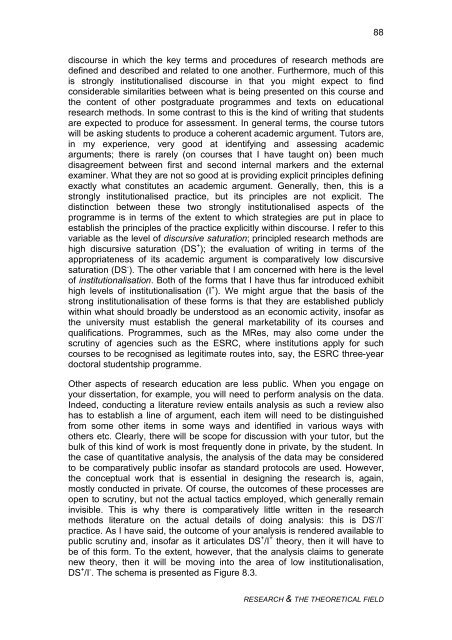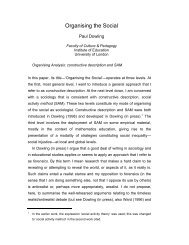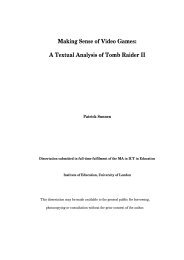Research and the Theoretical Field - Pauldowling.me
Research and the Theoretical Field - Pauldowling.me
Research and the Theoretical Field - Pauldowling.me
You also want an ePaper? Increase the reach of your titles
YUMPU automatically turns print PDFs into web optimized ePapers that Google loves.
88<br />
discourse in which <strong>the</strong> key terms <strong>and</strong> procedures of research <strong>me</strong>thods are<br />
defined <strong>and</strong> described <strong>and</strong> related to one ano<strong>the</strong>r. Fur<strong>the</strong>rmore, much of this<br />
is strongly institutionalised discourse in that you might expect to find<br />
considerable similarities between what is being presented on this course <strong>and</strong><br />
<strong>the</strong> content of o<strong>the</strong>r postgraduate program<strong>me</strong>s <strong>and</strong> texts on educational<br />
research <strong>me</strong>thods. In so<strong>me</strong> contrast to this is <strong>the</strong> kind of writing that students<br />
are expected to produce for assess<strong>me</strong>nt. In general terms, <strong>the</strong> course tutors<br />
will be asking students to produce a coherent academic argu<strong>me</strong>nt. Tutors are,<br />
in my experience, very good at identifying <strong>and</strong> assessing academic<br />
argu<strong>me</strong>nts; <strong>the</strong>re is rarely (on courses that I have taught on) been much<br />
disagree<strong>me</strong>nt between first <strong>and</strong> second internal markers <strong>and</strong> <strong>the</strong> external<br />
examiner. What <strong>the</strong>y are not so good at is providing explicit principles defining<br />
exactly what constitutes an academic argu<strong>me</strong>nt. Generally, <strong>the</strong>n, this is a<br />
strongly institutionalised practice, but its principles are not explicit. The<br />
distinction between <strong>the</strong>se two strongly institutionalised aspects of <strong>the</strong><br />
program<strong>me</strong> is in terms of <strong>the</strong> extent to which strategies are put in place to<br />
establish <strong>the</strong> principles of <strong>the</strong> practice explicitly within discourse. I refer to this<br />
variable as <strong>the</strong> level of discursive saturation; principled research <strong>me</strong>thods are<br />
high discursive saturation (DS + ); <strong>the</strong> evaluation of writing in terms of <strong>the</strong><br />
appropriateness of its academic argu<strong>me</strong>nt is comparatively low discursive<br />
saturation (DS - ). The o<strong>the</strong>r variable that I am concerned with here is <strong>the</strong> level<br />
of institutionalisation. Both of <strong>the</strong> forms that I have thus far introduced exhibit<br />
high levels of institutionalisation (I + ). We might argue that <strong>the</strong> basis of <strong>the</strong><br />
strong institutionalisation of <strong>the</strong>se forms is that <strong>the</strong>y are established publicly<br />
within what should broadly be understood as an economic activity, insofar as<br />
<strong>the</strong> university must establish <strong>the</strong> general marketability of its courses <strong>and</strong><br />
qualifications. Program<strong>me</strong>s, such as <strong>the</strong> MRes, may also co<strong>me</strong> under <strong>the</strong><br />
scrutiny of agencies such as <strong>the</strong> ESRC, where institutions apply for such<br />
courses to be recognised as legitimate routes into, say, <strong>the</strong> ESRC three-year<br />
doctoral studentship program<strong>me</strong>.<br />
O<strong>the</strong>r aspects of research education are less public. When you engage on<br />
your dissertation, for example, you will need to perform analysis on <strong>the</strong> data.<br />
Indeed, conducting a literature review entails analysis as such a review also<br />
has to establish a line of argu<strong>me</strong>nt, each item will need to be distinguished<br />
from so<strong>me</strong> o<strong>the</strong>r items in so<strong>me</strong> ways <strong>and</strong> identified in various ways with<br />
o<strong>the</strong>rs etc. Clearly, <strong>the</strong>re will be scope for discussion with your tutor, but <strong>the</strong><br />
bulk of this kind of work is most frequently done in private, by <strong>the</strong> student. In<br />
<strong>the</strong> case of quantitative analysis, <strong>the</strong> analysis of <strong>the</strong> data may be considered<br />
to be comparatively public insofar as st<strong>and</strong>ard protocols are used. However,<br />
<strong>the</strong> conceptual work that is essential in designing <strong>the</strong> research is, again,<br />
mostly conducted in private. Of course, <strong>the</strong> outco<strong>me</strong>s of <strong>the</strong>se processes are<br />
open to scrutiny, but not <strong>the</strong> actual tactics employed, which generally remain<br />
invisible. This is why <strong>the</strong>re is comparatively little written in <strong>the</strong> research<br />
<strong>me</strong>thods literature on <strong>the</strong> actual details of doing analysis: this is DS - /I -<br />
practice. As I have said, <strong>the</strong> outco<strong>me</strong> of your analysis is rendered available to<br />
public scrutiny <strong>and</strong>, insofar as it articulates DS + /I + <strong>the</strong>ory, <strong>the</strong>n it will have to<br />
be of this form. To <strong>the</strong> extent, however, that <strong>the</strong> analysis claims to generate<br />
new <strong>the</strong>ory, <strong>the</strong>n it will be moving into <strong>the</strong> area of low institutionalisation,<br />
DS + /I - . The schema is presented as Figure 8.3.<br />
RESEARCH & THE THEORETICAL FIELD




